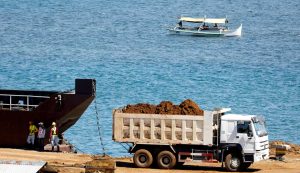SENATE President Francis G. Escudero has filed a resolution that seeks to review Philippine mining laws and the nonoptimal permit approval process, noting that 130 of 378 mineral production agreements are inactive.
“Inactive, nonoperational, invalid or unused exploration permits and mineral production sharing agreements prevent the government from issuing permits to or entering into agreements with other contractors,” he said in Senate Resolution No. 1310 filed on Feb. 5.
The Senate last week approved on third and final reading a bill that sets a five-tier margin-based royalty and windfall profit system for the mining industry, which is expected to raise the government’s share in mining profits.
It also seeks to ban the export on raw ores to boost local mineral production through the construction of domestic processing plants.
The Chamber of Mines of the Philippines earlier bucked the provision, saying it would lead to hundreds of thousands of job losses. Companies are unlikely to finish building their plants within the five years mandated by the bill, it added.
Senator Joseph Victor G. Ejercito, who sponsored Senate Bill No. 2826, earlier said lawmakers would decide on keeping or tweaking the raw export ban at a bicameral conference committee.
Only 248 of the 378 mining production sharing agreements are active and operating, Mr. Escudero said, citing data from the Mines and Geosciences Bureau (MGB).
“The suboptimal management and utilization of the country’s mining areas hamper the impact of mining operations on economic growth and employment,” the Senate chief said in the resolution. He added that mining and quarrying accounted for only 0.71% of country’s gross domestic product last year.
MGB data from 2023 also showed that national and local taxes, fees and royalties generated by the mining industry amounted to P41.72 billion that year, or only about 1.2% of the total tax revenues.
Mining companies now pay corporate income tax, excise tax, royalty, local business tax, real property tax and fees to indigenous communities.
The House of Representatives approved its version of the bill in September. Under House Bill No. 8937, large-scale miners inside mineral reservations must pay the government only 4% of their gross output, while the Senate version requires them to pay 5%.
The House version proposes an eight-tier margin-based royalty regime ranging from 1.5% to 5% and a 10-tier windfall profit tax system ranging from 1% to 10%.
The Finance department expects to generate about P6.26 billion in additional revenue under the new mining tax regime.
“The staggering number of inactive, nonoperational, invalid, or unused exploration permits and mineral production sharing agreements significantly and adversely affect the management and utilization of mineral resources,” Mr. Escudero said in the resolution. — John Victor D. Ordoñez


















